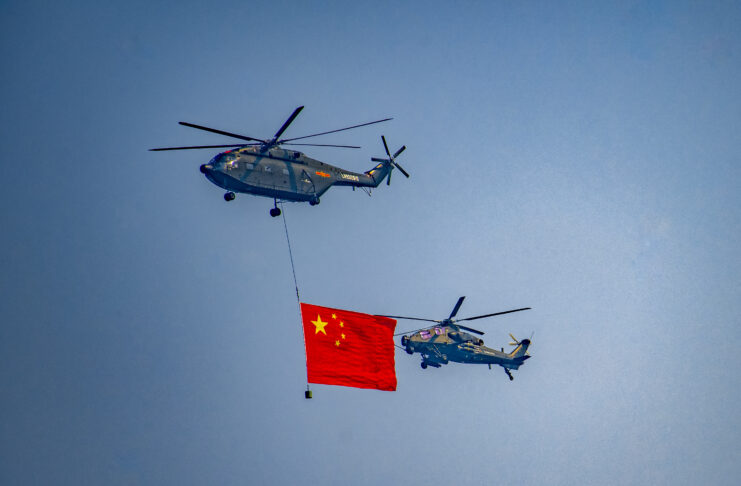ANALYSIS – In just a few years since 2015, China's new ‘leader for life,' Xi Jinping, has made the People's Liberation Army (PLA) a ‘world-class fighting force' that can challenge the U.S.
Its navy is now the largest in the world with a record number of new, high-tech combat ships. And it is rapidly expanding its strategic nuclear capability to soon match the U.S. and Russia. (RELATED: Putin's Nuclear Threats Grow – Russian ‘Doomsday' Nuke Sub Goes Missing)
In his speech at the party congress on Sunday, the Chinese Communist Party (CCP) chairman also appeared to convey a “newfound urgency” to his vow to seize Taiwan, the self-governing democratic island of 24 million which lies less than 110 miles from the mainland.
As CNN's ‘Meanwhile in China' newsletter notes: “‘The wheels of history are rolling on towards China's reunification and the rejuvenation of the Chinese nation. Complete reunification of our country must be realized,' Xi told the Congress to thundering applause.”
In his speech, Xi summarized the Communist Party's five-year plan, including China's ambition to become more capable of deploying its military forces on a regular basis, and in varied ways, to be able to “win local wars.”
A local war most likely refers to a fight to take Taiwan. (RELATED: Taiwan Warns China That Its Domestically Produced Cruise Missiles Can Strike Beijing)
Many experts have assessed that Xi wants to achieve this long-sought goal by 2027.
Last year, as The Washington Post reports, “the head of the U.S. Indo-Pacific Command told a Senate Armed Services Committee hearing that the threat of China's targeting Taiwan was ‘manifest during this decade, in fact, in the next six years.'”
However, speaking at Stanford University in California on Monday, Secretary of State Antony Blinken said Xi had made “a fundamental decision that the status quo was no longer acceptable” regarding Taiwan.
Blinken added that “Beijing was determined to pursue reunification on a much faster timeline.”
That could mean 2024 or 2025.
A likely scenario for attacking Taiwan could coincide with a contentious, if not contested, 2024 U.S. presidential election and inauguration in January 2025.
But, as CNN reports, Russia's serious troubles in Ukraine highlight the risks of relatively inexperienced major military powers conducting major operations in the modern world.
CNN writes: “many doubt that China — even with more naval assets than any other nation on the planet — can pull that off,” adding:
While the PLA Navy has been churning out ships — including a new aircraft carrier launched this year and numerous Type 055 destroyers, seen by some as the world's most powerful surface ships — doing so has been expensive.
And as Phillips O'Brien, professor of strategic studies at the University of St. Andrews in Scotland, points out, Taiwan has a relatively cheap way of countering them — by investing in the sort of small, land-based anti-ship missiles that Ukraine has been using to great success against Russia.
There are also major doubts about China's military command, and its ability to effectively conduct combined and joint operations in a major conflict. (RELATED: US Responds After China Says Its Forces Surrounded Taiwan in Latest Invasion ‘Rehearsal')
But Xi may have other ideas.
As CNN notes, Xi also signed an order covering ‘non-war operations' in June. This could be akin to what the U.S. has referred to previously as ‘low-intensity conflicts' (LICs), or military operations other than war (MOOTW).
While LIC and MOOTW have since fallen out of use, in U.S. doctrine MOOTW legitimately focuses on deterring war, resolving conflict, promoting peace and supporting civil authorities in response to domestic crises.
However, analysts have warned that China's language could be code for invading Taiwan — likening it to Vladimir Putin's invasion of Ukraine as a “special military operation.”
Others believe it signals Xi's intent for China to become more involved in small-scale military interventions across the region and the world — think embassy reinforcement, special ops raids, foreign military training, ‘show the flag' ops, etc.
These are things the U.S. military does very well — all the time.
Chinese state media have done their best to play down this order, saying it could cover benign actions such as international peacekeeping operations or providing disaster relief.
However, in addition to referring to possible novel new ways to attack Taiwan, CNN notes that:
Jonas Parello-Plesner, a senior fellow at the German Marshall Fund, is among those skeptical of the motives behind the non-war order.
He wrote in July that the new guidelines on non-war operations would be “a next step in bringing [China's] military presence out into the world — and likely another step away from the peaceful rise it once promised to the global community.”
And this could portend a more serious escalation in China's overseas adventurism and belligerence.
Where can we expect these forces to be deployed? Under what conditions?
Will we see Chinese marines operating in the Solomons or near Vietnam?
Will China use its militarized fake islands in the South China Sea as launch pads for ‘non-war operations'?
Whatever the case may be, expect Communist China under Xi to become far more adventurous militarily in the next several years.
Whether the PLA will be any good at what they do is still in doubt, but that doesn't make it any less dangerous.
In fact, Xi's delusional belief in China's need for significant, near-term victories makes China an increasingly volatile threat. ALD
The opinions expressed in this article are those of the author and do not necessarily reflect the positions of American Liberty News.
READ NEXT: Senate Democrats Unanimously Vote With China to Downsize US Economy >>



I would be concerned the plan is not 5 years but 5 months in collusion with Russia
They need 5 years for action